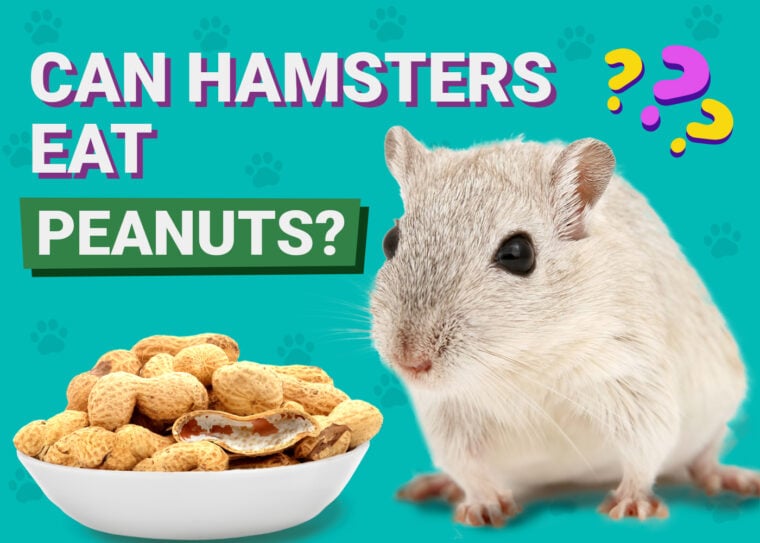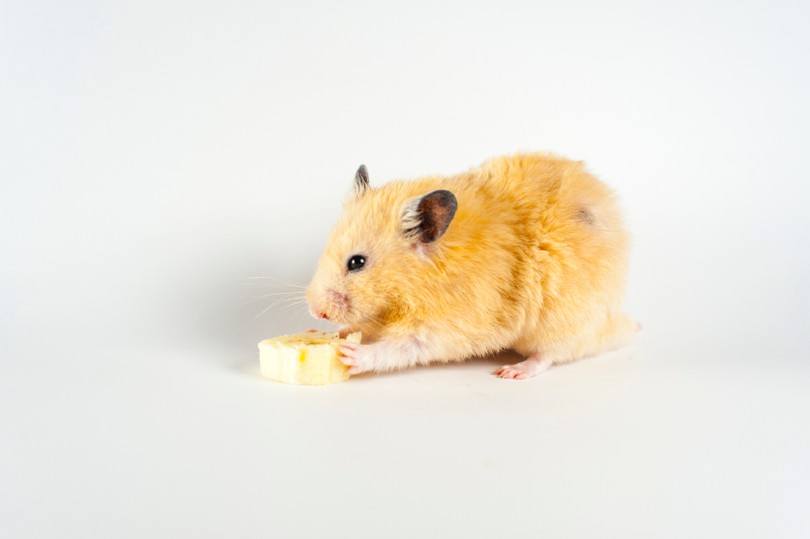
Hamsters are omnivores, which means that they eat anything. In the wild, they will forage various fruits, vegetables, nuts, and seeds, and they will eat some insects and other small animals. As well as feeding a high-quality pellet food, you can also give your hamster a supplementary diet of hay, vegetables, and fruit, at home.
You can even feed small treats like mealworms and boiled eggs. Peanuts are not only safe for your hamster but, in moderation, are quite healthy and are good for your rodent. They shouldn’t however, be salted or otherwise flavored, but they can be boiled or raw and they can even be given in their shell. Peanuts are a healthy addition to your hamster’s diet, but they should not be the sole source of food that you give to your rodent.
Typical Hamster Diet
Hamsters are rodents that come primarily from Syria but also from Greece, Romania, Belgium, and northern China. They live in warm climates, especially dunes and the edges of desserts. In the wild, they would eat any fruit and vegetable they find, along with seeds, nuts, and other food that they can forage. As omnivores, they will also eat insects and may indulge in meat that they find laying around.
As pets, hamsters can also be fed an omnivorous diet. They need to eat a diet consisting of approximately 16% protein and 5% fat. Most of their dietary requirements will be met via the feeding of a hamster pellet. Choose a high-quality pellet to ensure that it includes good quality ingredients and has the right mixture of protein, vitamins, and nutrients.
Although peanuts should not be the primary source of food for your pet rodent, they can be healthily and safely added to your hamster’s meals or fed as an occasional treat.

Peanuts contain vitamin B, vitamin E, and niacin. However, this doesn’t mean that you can throw your hamster a handful of peanuts every day. You need to monitor the amount that you feed, as well as the type and preparation of the peanut.
Can Salt Kill Hamsters?
You should never feed salted peanuts to your hamster. Salt is bad for hamsters, and you should avoid feeding it in any way or form. It increases the likelihood of vascular and heart diseases and can, by some estimates, reduce your hamster’s lifespan by up to 30%.
In the short-term, feeding salt to your hamster can cause dehydration and increase their need for water intake.
How Many Peanuts Can You Feed Your Hamster?
However, while salted peanuts are bad for your hamster, plain peanuts are not. They do have a high-fat content, so too many can cause your hamster to become overweight. You can feed a single peanut once or twice a week, but you should not feed more than this.
Peanut butter, at least in some forms, is also perfectly safe to feed your hammy. It needs to be pure, unsalted, and unprocessed because this is just mashed up peanuts. In these cases, you can feed a very small amount of peanut butter once a week. Do not feed more than this, or more often.

Do Hamsters Like Nuts?
Hamsters would eat nuts and seeds in the wild. They would eat different types, including peanuts where available. Although every hamster is different and has its own unique likes and dislikes, most hamsters like the smell and the flavor of peanuts and other nuts.
Alternatives to Peanuts
It is perfectly safe to feed your hamster a single peanut once or twice a week, or the equivalent amount of pure peanut butter. However, this should represent only a small amount of your hammy’s diet. Their diet will consist of 90% pellets and 10% additional foods. Other treats you can give your hamster include:
Vegetables
Hamsters can benefit from being given green vegetables. They especially like broccoli and can enjoy romaine lettuce, but you should avoid giving them iceberg lettuce because of the high water content. You can also feed cabbage and carrot tops.

Fruit
Some fruit can also be fed, although this must also be in moderation because fruit has a high natural sugar content that can cause your hamster to become overweight. If you are feeding apples, feed only the flesh of the fruit and remove the skin and the seeds before feeding. Avoid giving any citrus fruit and opt for pears and grapes instead.
Can Your Hamster Eat Raisins?
Raisins are just a dried form of grape. They are popular as a food and, in some parts of the world, are turned into alcohol. They are also small and convenient, and hamsters tend to like the smell and the taste of these sweet, sticky little treats. Thankfully, raisins are safe to feed to your hamsters, but the high sugar content means that you should not feed them to dwarf hamsters. You should only feed a maximum of one raisin a day to your hammy, although typically less than this amount is better.

Can Hamsters Eat Bananas?
Bananas are another fruit that is naturally high in sugar but considered safe for hamsters when fed in moderation. You can feed a quarter of a teaspoon of the yellow fruit, once or twice a week, and this will be ample for your hamster.
Final Thoughts
Hamsters should be fed a diet made up of 90% high-quality food pellets. The remaining 10% can include additional ingredients like some forms of hay, high-protein treats like boiled egg and mealworm, and a combination of fruit and vegetables. Peanuts, unsalted and unflavored, make a tasty and beneficial addition to their diet, too. You can feed a single peanut once or twice a week, or you can feed the equivalent in pure peanut butter.
- See also: Can Hamsters Eat Walnuts?








